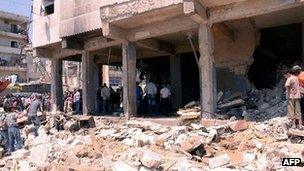Aleppo blast: 'Five killed' in new Syria unrest
- Published

A blast on the outskirts of Syria's second city Aleppo has killed at least five people, opposition activists say.
The blast went off in a car wash in the Tall al-Zarazeer district, the Syrian Observatory for Humans Rights said. Activists say the business was linked to pro-Assad militias.
At least four people were killed in the city on Thursday when security forces raided a student hall of residence.
In Damascus, two blasts on Saturday caused damage but no-one was hurt.
It is not known whether the people hurt in the Aleppo explosion were civilians or members of the security forces, an Observatory spokesman said.
An activist of the rebel Free Syrian Army in Aleppo told Reuters news agency that the group carried out the attack on the car wash, which it said was being used by a pro-regime militia.
"We placed a bomb inside a car," the activist Ali al-Halabi said, adding that he had seen seven dead bodies and several more wounded at the scene of the blast.
Earlier reports said the explosion had targeted a passing bus.
One of the explosions in Damascus was caused by a bomb planted under a car in al-Thawra street, a key thoroughfare.
The blast damaged nine nearby vehicles and left a crater in the street. However, there were no casualties either from that blast or another one in the capital.
Regular occurrence
Bomb attacks are now a regular occurrence in Damascus and Aleppo, which have otherwise been spared the worst violence of the Syrian conflict, the BBC's Jonathan Head reports from Istanbul.
Violence has continued in Syria despite a ceasefire between government and the opposition forces which forms part of a peace plan mediated by the UN and Arab League envoy, Kofi Annan.
An advance party of UN monitors is already in the country to supervise the truce, and the UN's peacekeeping chief, Herve Ladsous, has said he hopes 300 observers will be on the ground by the end of May.
While the violence not as intense as it was before the plan came into effect, there seems little hope the full-strength monitoring team can bring about sufficient calm for any kind of political talks to start, our correspondent says.